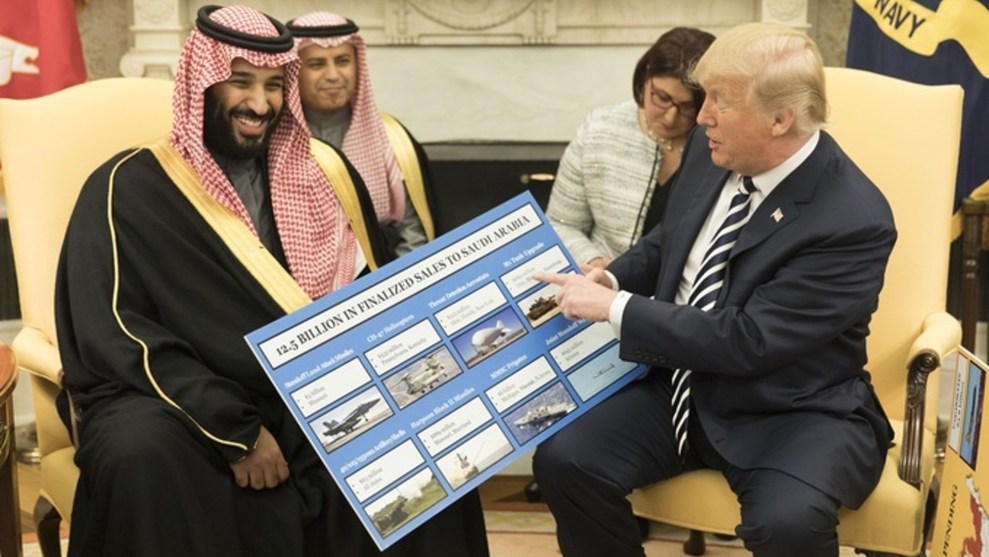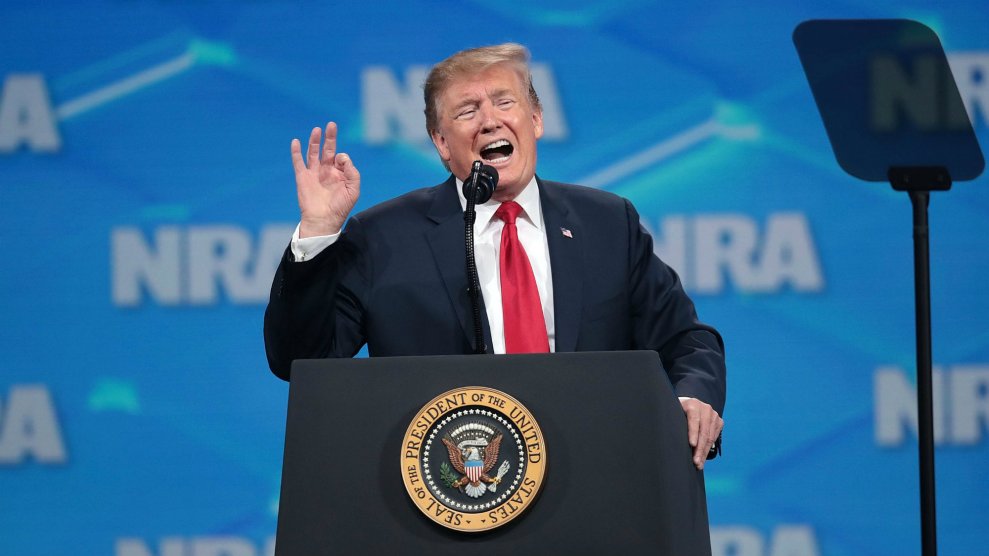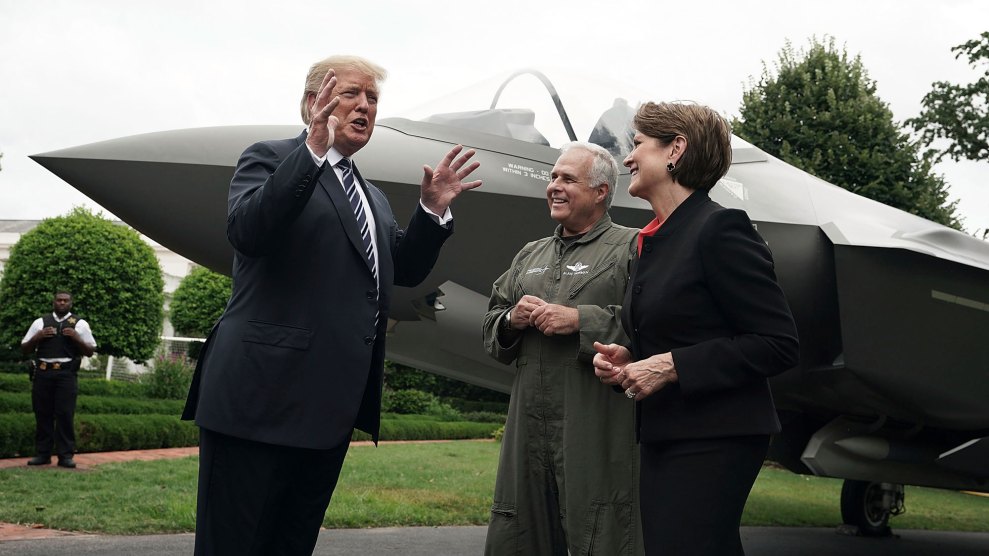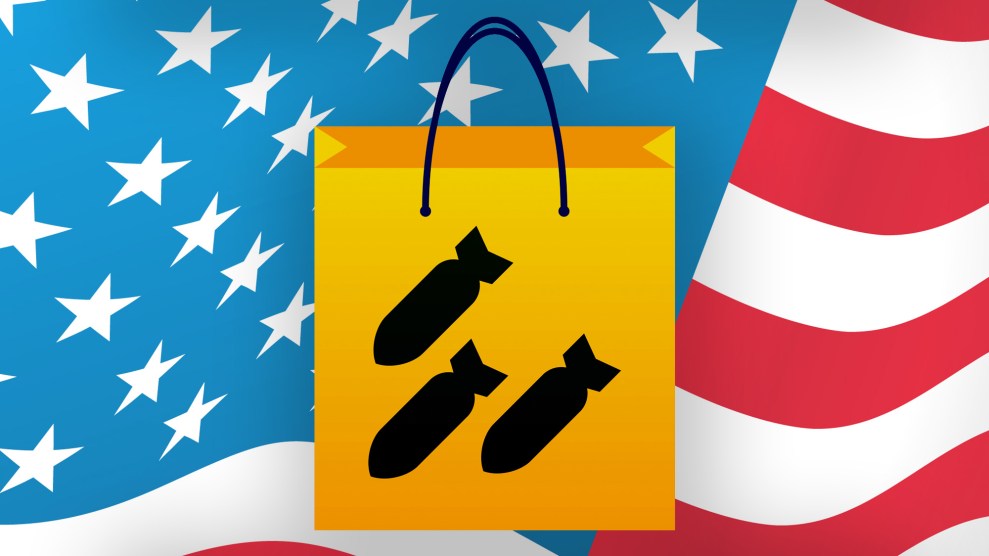
President Donald Trump discusses arms sales to Saudi Arabia with Crown Prince Mohammed bin Salman.SMG/Zuma
President Donald Trump has become a relentless booster for weapon sales to Saudi Arabia, despite the kingdom’s increasing authoritarianism under the rule of its de-facto leader Crown Prince Mohammed bin Salman. The president has bragged at times that arms deals with the country would create anywhere from 500,000 to “over a million” jobs. Even after the killing of journalist Jamal Khashoggi put pressure on the United States to reconsider its alliance with the country, Trump released a lengthy statement defending the kingdom, noting specifically that its commitment to buy US weapons “will create hundreds of thousands of jobs, tremendous economic development, and much additional wealth for the United States.”
Well, according to a new report, those claims haven’t come close to panning out, despite the Trump administration fast-tracking $8 billion in arms sales to Saudi Arabia and the United Arab Emirates last year. (In an interesting confluence of news, we now know this move was being investigated by the State Department inspector general who Trump fired last week.)
A report from the left-leaning think tank Center for International Policy looks at Trump’s major weapons sales last year and concludes that “the President’s claims of up to 500,000 jobs from arms sales to Saudi Arabia are more than ten times the actual total of 20,000 to 40,000 jobs.” The report also finds that on the whole the impact of arms sales across the US economy remains relatively minor. Using data from the Defense Department’s Foreign Military Sales program, the researchers found that arms sales in one year generate only 189,000 jobs in the United States, equivalent to “roughly one-tenth of one percent of the total US job market.”
Part of the reason for the substantially lower figures is the way arms deals “play out over time,” report co-author William Hartung said on a conference call with reporters Thursday morning. “You may have a large offer, but the actual money flowing in a given year is actually quite small.” As in, if Trump made the deal last year, the production of the promised weapons would still take years to complete.
Trump also seems to not realize that a good number of the workers associated with these deals are stationed overseas due to “offsets,” or co-production agreements between the United States and other countries. Saudi Arabia, which is the world’s largest arms importer, aims to localize 50 percent of its defense spending by 2030—and American defense companies have adjusted their workflows to suit the kingdom’s strategy. Among the examples cited in the report: a $450 million deal with Boeing to localize maintenance and repair for US-produced aircraft in Saudi Arabia and a commitment from Lockheed Martin to assemble helicopters in the kingdom. The report finds that 10 percent of US arms agreements made in 2019 “involved licenses for the production of US weapons overseas, further undercutting job creation in the United States.”
The discrepancy between Trump’s promises and the reality is particularly worrisome as the president has boosted weapon sales to America’s Gulf allies at all costs, even bypassing Congress to do so—begging the question of just who will actually profit. Last year, the United States made agreements worth more than $85 billion in foreign arms sales, a $6.3 billion increase from 2018, making 2019 a record year for arms dealers. The $8 billion deal with Saudi Arabia—the one now the center of the State Department IG investigation—was pushed through by a former Raytheon lobbyist who developed the plan for Trump to declare an “emergency” over Iran that would permit the deal to proceed without congressional approval. Raytheon, in fact, made $14.2 billion off arms sale agreements in 2019 and has been among the most ardent advocates for more weapons deals with Saudi Arabia. The defense giant has, according to a recent New York Times report, “assiduously courted” support from officials close to Trump like White House trade adviser Peter Navarro. The company has also hired David Urban, a West Point classmate of Secretary of State Mike Pompeo, as one of its lobbyists.
Of course, there’s also the grim question of who is harmed by all these weapon sales. A series of recent investigative reports have linked US weapons to war crimes and other massive civilian casualty events, particularly in Yemen, where the United States continues to support Saudi Arabia’s military intervention. After attempting to block a weapons transfer in July, Congress was stymied by Trump’s veto. An override attempt in the Republican-controlled Senate failed. That same day, the Saudi military coalition bombed a market in northern Yemen, according to the Associated Press, “killing at least 10 civilians, including children.”













